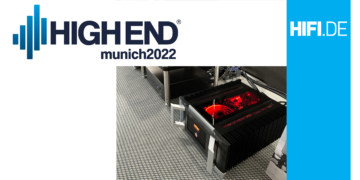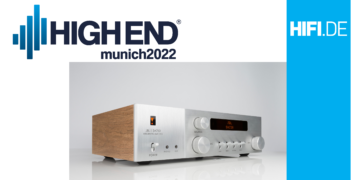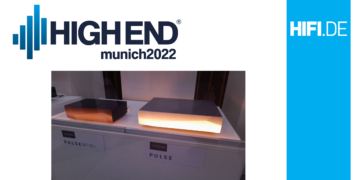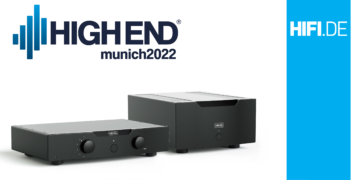| HIFI-FORUM » English » Stereo (Engl.) » Are we moving towards a transport-less future ? | |
Gehe zu Seite: |vorherige| Erste Letzte
|
|
||||
Are we moving towards a transport-less future ?+A -A |
|||||
| Autor |
| ||||
|
sivat
Stammgast |
#51
erstellt: 04. Jul 2008, 13:42

|
||||
One Clarification - I never doubted EAC. I believe, it does what it has to do. |
|||||
|
zhopudey
Stammgast |
#52
erstellt: 04. Jul 2008, 13:57

|
||||
eehh?  Then what have we been arguing about?  Please continue the discussion about transports, spdif, etc... its very educative for me  P.S. A quick doubt - are commercial transports connected to dacs thru spdif as well? If so, then where do the differences in sound between transports and sound cards arise? So the transports do some digital filtering? |
|||||
|
|
|||||
|
square_wave
Inventar |
#53
erstellt: 04. Jul 2008, 14:13

|
||||
The EAC can do its job but the rest of chain has to good. Namely the transport and the associated electronics with it. Or you will end up with a file which is bit perfect but with timing errors. Am I right  ? ?Does this mean that a bit perfect file can have timing errors ? [Beitrag von square_wave am 04. Jul 2008, 14:15 bearbeitet] |
|||||
|
reignofchaos
Stammgast |
#54
erstellt: 04. Jul 2008, 15:57

|
||||
|
Granted there can be timing errors since obviously the transport in a dvd rom/writer is not great... but what is the probability of a timing error occuring at a particular bit everytime if the same bit is being read ten times? Virtually zero... so I don't get what the fuss is all about  The basic difference essentially is that the so called high end transport reads a bit just once when playing while when extracting data from a cheap DVD drive, the same bit is read multiple times to ascertain whether what was read is correct. So the process is entirely different and the typical articles relating to jitter that you are referring to do not apply in this case. [Beitrag von reignofchaos am 04. Jul 2008, 16:02 bearbeitet] |
|||||
|
Manek
Inventar |
#55
erstellt: 05. Jul 2008, 09:08

|
||||
|
A question.... In what way can a bit perfect file have timing errors ? If so then can the file be called bit perfect ? The term "bit perfect" would mean perfect in data and time info. No ? Manek |
|||||
|
reignofchaos
Stammgast |
#56
erstellt: 05. Jul 2008, 23:45

|
||||
Err there is no timing information in a sound file other than the sampling rate. All are the following tag and then the data: WORD wFormatTag; WORD nChannels; DWORD nSamplesPerSec; DWORD nAvgBytesPerSec; WORD nBlockAlign; WORD wBitsPerSample; WORD cbSize; WORD refers to 16 bits and DWORD refers to 32 bits. Format tag is typically PCM, channels either 2/5/7, Samples per second is generally 44100 or 48000 or 96000 depending on sampling rate. block alignment is Bit/sample*No of channels. Bytes per second is block alignment*samples per second. Bits per sample is 16 or 24. cbSize is additional information. After this is the actual data which essentially is a list of amplitude values of the audio which must be read based upon the above structure. The number of elements depends on the number of channels and also the length of the sound clip. Thats all there is to a wave file or any other form of uncompressed digital audio and this is all the information that a DAC needs to convert the digital signal into music. [Beitrag von reignofchaos am 05. Jul 2008, 23:46 bearbeitet] |
|||||
|
sivat
Stammgast |
#57
erstellt: 06. Jul 2008, 02:40

|
||||
This is for WAV File ..and not for PCM. Reading a WAV files falls under "CD*ROM" (Yellow Book) ...there will be not be any jitter problem due to the nature of the format. |
|||||
|
reignofchaos
Stammgast |
#58
erstellt: 06. Jul 2008, 10:07

|
||||
|
I wasn't talking about PCM at all. Manek was asking about bit perfect file formats for digital storage. Audio on CD is much simpler. It has frames of six 16 bit samples, nine error correction bytes in cross interleaved reed-solomon encoding and a subchannel code. This is the basic problem with CDs as this form of encoding interpolates unreadable errors. Also this interpolation and reading is completely transport dependent and hence there's no way to know if what was read is correct or not. This again is compounded by the fact that CDs don't have block accurate addressing and hence jitter creeps in. |
|||||
|
Manek
Inventar |
#59
erstellt: 06. Jul 2008, 12:26

|
||||
|
Reign, thanks for the format structure. Had never read the redbook or the yellowbook formats in depth till date but now I will. My query came from reading a previous post which hints at lossless files being bit perfect and not timing perfect. Manek |
|||||
|
sivat
Stammgast |
#60
erstellt: 06. Jul 2008, 16:52

|
||||
Ah !! |
|||||
|
sivat
Stammgast |
#61
erstellt: 07. Jul 2008, 03:20

|
||||
Manek, The answer is there for you in the stereophile article...it clearly illustrates it. Please take some time to read it. Siva. |
|||||
|
Arj
Inventar |
#62
erstellt: 07. Jul 2008, 05:43

|
||||
|
This discussion on AA is also worth reading..although it is more related to Trnaports and how they read...and there are vested interests at work here so its quite easy to get swayed either way !  http://www.audioasylum.com/cgi/vt.mpl?f=digital&m=131391 http://www.audioasylum.com/cgi/vt.mpl?f=digital&m=131391I guess the jury is still out on this one and this thread should be very interesting learning ! i am very interested in the conversion of Redbook to Yellowbook and what it takes to do that. i guess that is what we are talking off here. Siva, that sterephile link is really good on first read..need to read it slowely to digest it ! [Beitrag von Arj am 07. Jul 2008, 05:47 bearbeitet] |
|||||
|
sivat
Stammgast |
#63
erstellt: 21. Jul 2008, 05:37

|
||||
 http://www.stahltek.com/vekian_da.htm http://www.stahltek.com/vekian_da.htmAnother DAC..that seems intresting. Not heard it though. The interview with the designer is quite good. I really like this kind of "no-nonsense" marketing...which educates the customers without trying to fool them with exaggerated statements. I like the part ..where the designer explains about the output stage...my experience with DACs has been the same. You can also use an USB for a audio stream, which is very easy to integrate with traditional DAC. I do not think a LAN interface will be any better tha a USB...unless you are hooking up the DAC direct to an internet/intranet audio stream. |
|||||
|
Arj
Inventar |
#64
erstellt: 21. Jul 2008, 08:12

|
||||
|
shouldnt the Lan be better than an USB ? I believe the USB interface utilises a lot of CPU time, thus making it very Jitter prone ? the LAN on the other had is isolated due to the inherent interface standard and not really prone to jitter. |
|||||
|
sivat
Stammgast |
#65
erstellt: 21. Jul 2008, 08:43

|
||||
Not really. It is a data-stream (very dirrerent from PCM). Remember USB is also a two way communication mechanism, unlike SPDIF. So a lot depends on the "driver" on the PC side and the RX module of the DAC...and the algorithm that is implemented to control/reduce data errors. In LAN, the underlying protocols are already available, however in case of USB...a error control protocol has to be implemented by the manufacturer. Note : I'm assuming we are NOT talking about streaming PCM over USB, but equivalent of WAV/FLAC formats...and hoping the DAC supports it. Even in case of asyncronous communication, both USB and LAN would have the same problem...plz read the following link ..  http://forum.stereop...age=0&fpart=all&vc=1 http://forum.stereop...age=0&fpart=all&vc=1 [Beitrag von sivat am 21. Jul 2008, 08:52 bearbeitet] |
|||||
| |||||
|
|
||||
Gehe zu Seite: |vorherige| Erste Letzte
| Das könnte Dich auch interessieren: |
|
Heading towards holy grail Prithvi am 05.07.2005 – Letzte Antwort am 05.07.2005 – 3 Beiträge |
|
Good cost effective options as a transport square_wave am 20.03.2009 – Letzte Antwort am 02.04.2009 – 50 Beiträge |
|
A different approach towards traditional speaker setup Arj am 04.12.2005 – Letzte Antwort am 07.12.2005 – 7 Beiträge |
|
Cd Transport myriad am 18.09.2006 – Letzte Antwort am 20.09.2006 – 15 Beiträge |
|
What Are We Doing To Our Music? viren am 17.07.2006 – Letzte Antwort am 22.07.2006 – 26 Beiträge |
|
FUTURE ARRIVALS AT ABSOLUTE PHASE Prithvi am 04.01.2005 – Letzte Antwort am 06.01.2005 – 9 Beiträge |
|
Future of systems and music? Jeeves am 23.10.2005 – Letzte Antwort am 03.11.2005 – 14 Beiträge |
|
An amp for 50k rupees or less Kurotark am 05.04.2008 – Letzte Antwort am 08.06.2008 – 136 Beiträge |
|
Good read: are amps really different Arj am 05.03.2006 – Letzte Antwort am 07.03.2006 – 19 Beiträge |
|
DACs - Are they a worthy upgrade ? neono am 06.05.2010 – Letzte Antwort am 20.08.2010 – 29 Beiträge |
Anzeige
Produkte in diesem Thread

Aktuelle Aktion
Top 10 Threads in Stereo (Engl.) der letzten 7 Tage

- Good speakers for old system
- Jamo Concert E750 and E770
- Replacing Stock Jumpers on NAD/Marantz
- FYI: Cadence latest price list
- One speaker "louder" than the other?
- TNT triple T loudspeaker cable
- Vincent SV 231
- Planar speakers
- Best Amp for Quad 11L? Nad vs Rotel vs Marantz vs CA
- Is Jamo E-series worth it?
Top 10 Threads in Stereo (Engl.) der letzten 50 Tage

- Good speakers for old system
- Jamo Concert E750 and E770
- Replacing Stock Jumpers on NAD/Marantz
- FYI: Cadence latest price list
- One speaker "louder" than the other?
- TNT triple T loudspeaker cable
- Vincent SV 231
- Planar speakers
- Best Amp for Quad 11L? Nad vs Rotel vs Marantz vs CA
- Is Jamo E-series worth it?
Top 10 Suchanfragen

Forumsstatistik

- Registrierte Mitglieder930.789 ( Heute: 3 )
- Neuestes MitgliedChriSo65
- Gesamtzahl an Themen1.563.799
- Gesamtzahl an Beiträgen21.835.655













